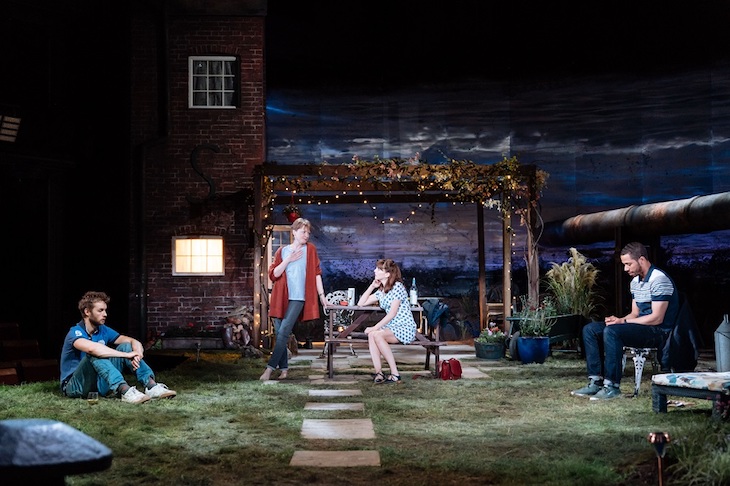The Bridge’s big summer show is Nightfall by prize-winning newcomer Barney Norris. Widowed Jenny wants her grown-up kids, Lou and Ryan, to help her run their farm in Hampshire following their dad’s death. But Lou’s boyfriend, Pete, has been offered work abroad. That’s the only major snag in this low-wattage rustic melodrama. The back story involves a secret abortion and a criminal assault for which the wrong person was imprisoned, but the plot centres on clingy Jenny’s desire to curb her nippers’ wanderlust. She’s a needy chatterbox who isn’t entirely without charm, and the same could be said of the other ho-hum characters who pass their time sprawling on a scruffy lawn, boozing and nattering. Large chunks of the dialogue might have been lifted from Radio 4’s farmer-drama The Archers.
The script has inconsistencies that could benefit from a visit to the menders. Ryan shoots crows with a magical rifle that doesn’t need to be reloaded. Pete rigs up a siphon to steal fuel from an oil pipe that runs across the family’s land but he seems unaware that the oil company’s drone fleet would swiftly detect this crime. Jenny threatens to report Pete to the cops but since she’s the property holder, and the principal beneficiary of the theft, she would struggle to escape prosecution herself. The designer Rae Smith has done a terrific job with the hulking pipe whose monstrous flanks dominate the garden like a rusting brontosaurus. Yet its presence is distracting.I kept looking at the pipe instead of the actors burbling and wittering in its shadow.
Why has the theatre’s boss, Nicholas Hytner, scheduled this tepid soap opera to coincide with the seasonal influx of north Americans? Most English-speaking visitors to the capital feel they ought to ‘see something’ in the West End — and they may not care what. But I doubt if many will risk their hard-earned dollars on an unknown melodrama by an obscure British youngster set in the Home Counties and lacking a star with an American fan base. They’re likelier to plump for an out-and-out crowd-pleaser like Tina: The Musical. This isn’t just a recital of hits, it’s an investigation into the temptations and pitfalls of stardom. We’re introduced to the young Tina (real name Anna Mae Bullock) as she’s visited by the charismatic monster Ike Turner. Kobna Holdbrook-Smith delivers a compelling study in artistic brutality and he portrays Ike as an inspired dictator, a crazed thug touched by genius. He marries Tina to make her a star and he beats her up to stop her enjoying her fame. Alas, he disappears in Act Two, which creates a void the production can’t quite fill. Other male characters shine as well. Tom Godwin does a great cameo as the creepy, controlling Phil Spector. And there’s good work from Heaven 17, a group of amiable goofballs, who produced Tina’s 1983 hit ‘Let’s Stay Together’.
Tina herself is curiously flavourless. She seems like a wax mould on which destiny stamps itself three times. She becomes famous, becomes destitute, becomes famous again. Her outstanding quality, persistence, is an attribute of all living organisms, and it doesn’t lend itself well to drama. It’s worth noting that she was never an era-defining talent like Madonna or Bowie. In the 1980s she was regarded as faintly embarrassing (‘naff’ as we said), a soft-rock stadium-filler like Robert Palmer or Phil Collins. The show includes several scenes that probe the fascinating business of hit-making in a studio. And it unwittingly reveals the decline in the quality of pop music following the end of the 1960s. ‘River Deep — Mountain High’, from 1966, contains one of swiftest and most exhilarating ascents in the entire canon of soul music. It starts meekly with, ‘When I was a little girl/ I had a rag-doll’, and just25 seconds later it propels you into the stratosphere with ‘And it gets stronger/ In every way’. But by the 1980s a funereal foot-tapper like ‘Private Dancer’ was good enough to become a hit.
I loved this show. I loved its muscularity and honesty, its contagious sense of fun and excitement. The crowd, mainly white women over 50, celebrated the finale — ‘Simply the Best’ — by bopping in the aisles. And yet the director, Phyllida Lloyd, is also responsible for drearily pretentious versions of Shakespeare with modern settings and all-female casts (dubbed ‘ovarian Shakespeare’ by the wags). The difference is evident in the reaction at the end. When Tina reached its climax the crowd went briefly, and genuinely, crazy. This was a far cry from the synthetic and competitive ‘look-at-me’ clapping that greets the curtain call at an ovarian Shakespeare production. It’s a question of consuming art in the wrong tense, as one does with chocolate and wheatgerm. One eats chocolate in the present tense, to eat chocolate. One eats wheatgerm in the future-perfect tense, to have eaten wheatgerm.







Comments